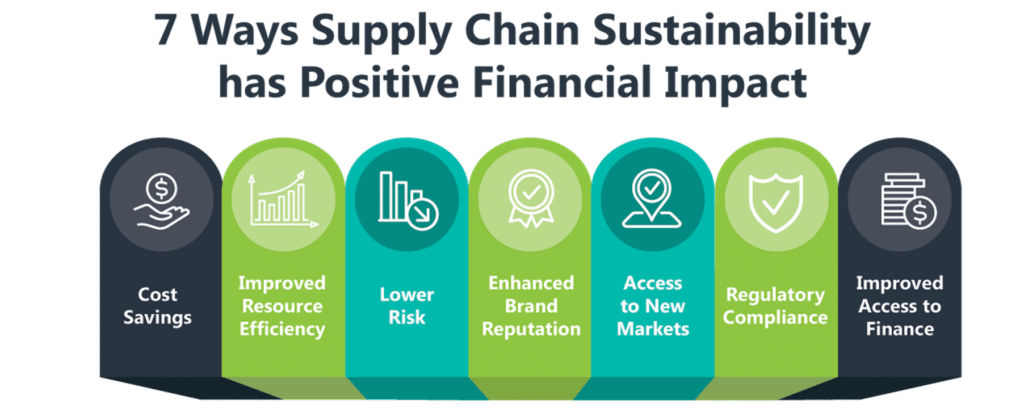
If you’re just starting your journey of supply chain sustainability, you may be standing at the precipice full of questions. What is Supply Chain Sustainability? Does it have value for my business? How does it help me gain a competitive advantage?
Logility’s, Lachelle Buchanan, shared her thoughts on the importance of supply chain sustainability and the benefits of leveraging supply chain sustainability planning software.
What is Supply chain Sustainability?
Let’s take a look at the basics and answer the question, what even is “supply chain sustainability”?
Supply chain sustainability is the integration of environmentally and socially responsible practices into supply chain management, aimed at reducing the environmental and social impact of the supply chain while also creating long-term value for all stakeholders.
Businesses are increasingly aware of the impact of their operations on the environment and are seeking ways to reduce their carbon footprint and adopt sustainable practices. Moreover, social and environmental issues can significantly impact business operations and reputation, and sustainable practices can mitigate such risks.
The growing demand for sustainable products and services is another driver of supply chain sustainability. Consumers are becoming more aware of the environmental and social impact of products they buy, and they are increasingly looking for products that are sustainably sourced and produced. By adopting sustainable practices in the supply chain, companies can meet this demand and gain a competitive advantage.
There are several key strategies that companies can use to promote supply chain sustainability.
- One is adopting a lifecycle approach to product design and development, which involves considering the environmental and social impact of the product at every stage of its lifecycle.
- Another is working with suppliers to promote sustainable practices throughout the supply chain, such as setting sustainability standards for suppliers, conducting audits, and providing training and support.
- Adopting circular economy principles that minimize waste and maximize reuse and recycling of materials is another effective strategy.
- Companies can promote supply chain sustainability by engaging with stakeholders, soliciting feedback, providing transparency around supply chain operations, and collaborating to identify opportunities for improvement.
What is the Financial Impact of a Sustainable Supply Chain?
The financial value that companies can gain from implementing a sustainable supply chain is significant and diverse. Research consistently demonstrates that companies with sustainable supply chains tend to outperform their counterparts financially.

Let’s explore some concrete examples of how this can be achieved:
- Cost savings: By integrating sustainable practices into the supply chain, such as minimizing energy consumption, waste, and emissions, companies can realize substantial cost savings. For instance, optimizing operations for energy efficiency can lead to reduced energy bills, while effective waste management can lower disposal costs.
- Improved resource efficiency: Sustainable practices contribute to improved resource efficiency, reducing the need for raw materials, water, and energy in the production process. This results in lower input costs and enhanced overall efficiency within the supply chain.
- Lower risk: Embracing supply chain sustainability mitigates risks associated with environmental and social issues like climate change, water scarcity, and human rights violations. By minimizing these risks, companies can avoid costly disruptions to their supply chains and prevent reputational damage.
- Enhanced brand reputation: Companies with sustainable supply chains enjoy the benefit of an enhanced brand reputation, fostering increased customer loyalty. As consumers become increasingly concerned about environmental and social matters, they are more inclined to support companies that demonstrate a genuine commitment to sustainability.
- Access to new markets: Sustainable supply chains create opportunities to tap into new markets. For instance, companies producing sustainable products can target consumer
- segments that prioritize environmentally friendly options, such as the growing green consumer segment.
- Regulatory compliance: Maintaining a sustainable supply chain ensures compliance with environmental regulations, effectively averting potential fines and penalties.
- Improved access to finance: The financing landscape is evolving, with investors and lenders showing a growing interest in funding sustainable businesses. Companies that have sustainable supply chains often enjoy better access to finance and lower borrowing costs compared to those with unsustainable practices.
Research consistently demonstrates that companies with sustainable supply chains tend to outperform their counterparts financially. For instance, a study conducted by CDP revealed that companies with strong environmental performance exhibited higher return on equity (ROE) compared to their peers. Additionally, the Harvard Business Review found that companies excelling in environmental and social performance tended to have higher market value and lower cost of capital.
Implementing sustainable practices in the supply chain offers numerous financial benefits. Such as cost savings, improved resource efficiency, risk reduction, enhanced brand reputation, access to new markets, regulatory compliance, and improved access to finance. These benefits not only create long-term value for stakeholders but also contribute to the development of a more sustainable and resilient economy.
Ready to decide your next step in your Supply Chain Sustainability journey? Check out the Balancing Sustainability with Profitability Executive Brief to get started: https://www.logility.com/executive-briefs/balancing-sustainability-with-profitability/

Written by
Lachelle Buchanan
Vice President, Product Marketing
Short bio
Lachelle Buchanan is the vice president of product marketing at Logility, where she leverages over 15 years of experience in unifying the expertise of product development teams with the market insight of sales teams for successful new product introductions. After spending half her career in marketing and the other half in supply chain, Lachelle is most passionate about bringing teams together to solve complex supply chain challenges and delivering value for customers. Owing to a passion for advanced Sales & Operations Planning, Lachelle has Oliver Wight certifications in Integrated Business Planning (Advanced S&OP), Demand Management, Integrated Supply Chain Management and Product & Portfolio Management.



